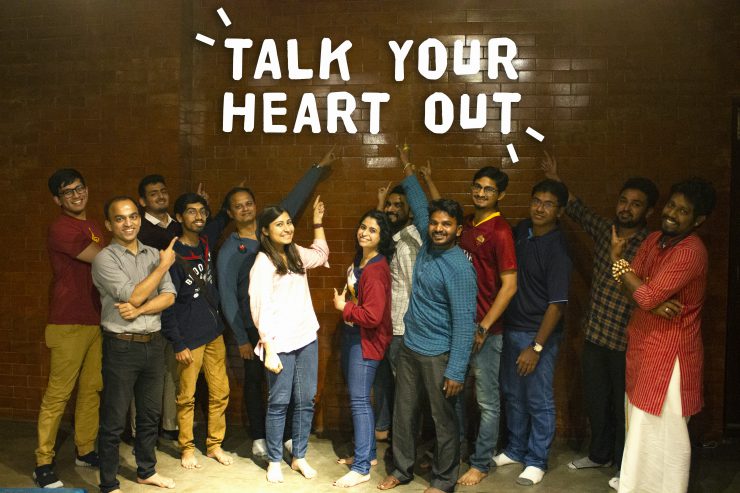The eleventh session of Talk Your Heart Out was a vivacious affair with fourteen participants from different walks of life coming together to share notes on cancer. The evening was dedicated to experiences related to cancer, to empathic conversations and the sharing of useful information around the treatment of cancer.
 When cancer strikes a loved one
When cancer strikes a loved one
Anup* was the first to share his story. His paternal grandmother had experienced pancreatic cancer when he was still in school. Watching his grandmother undergo the treatment, and yet get worse with time, left a lasting impression on him. He had never spoken about this until now. He just felt like sharing it with the group since he knew everyone in the group has had similar experiences. Shruti chimed in to say that she had gone through a similar experience with her own paternal grandmother. She too had watched her being treated for cancer and had been affected by her absence later in life. The feeling of losing a loved one to cancer was something almost everyone in the group had gone through at some point in life. But cancer care is making progress and it is important to not let the events of the past cast their shadow on the future. One way to combat this feeling of despondency associated with cancer is to be aware of the new developments in the screening and treatment of cancer.
A comprehensive approach to cancer care
Gagan* shared details of the treatment that his father is currently undergoing. His father was diagnosed with cancer in 2019. Based on the recommendations of the oncologist that they consulted, his father is currently undergoing chemotherapy. They are also looking at options in immunotherapy. Gagan has also been focusing on improving the quality of his father’s life. When possible, he convinces his father to attend small gatherings or to visit a relative. In this way, he hopes that a bit of socialization will help distract his father from the pain and discomfort, at least for a short duration of time.
Gagan also pondered over whether certain behavioural patterns or emotions could be considered a risk factor for cancer. He was interested in looking at research in this direction and invited others from the group to collaborate with him on this.
The importance of cancer awareness
Mahesh*’s perspective of cancer treatment was different from that shared by the others owing to his family living in a rural area. Being farmers by profession, his family had very little knowledge of cancer and were unwilling to be guided by the educated, younger generation. Mahesh feels that this was a roadblock in availing the best cancer treatment for his paternal uncle who was detected with throat cancer. Even today, in many parts of India, cancer is viewed as a terminal illness, although several treatment options now show positive outcomes. Lack of awareness and a regressive mindset prevents patients from receiving better cancer care, even in cases where the survival rates are hopeful.
Mahesh also shared the story of a child he had met a few years ago. The child was suffering from leukemia but his father was unable to find the resources to fund the treatment. Witnessing the suffering of the child made Mahesh wonder how unfair the situation was. The moderators helped Mahesh understand that cancer was an illness, and ill-health is not a desirable situation for anyone. However, there are different ways of screening for cancer so that it can be treated while it is still in the early stages. This greatly increases the chances of a positive prognosis. There are also several insurance policies available at a low monthly cost, specifically for cancer treatment. Awareness of these can help several families fund cancer treatment in a better way.
When in the genes, brace up
Derek*, who lives in Australia but is currently on holiday in India, spoke about his grandfather’s lung cancer. He too was interested in exploring the insurance options available for cancer. Once we know that cancer runs in our family, we must brace ourselves for a possible diagnosis by preparing ourselves financially. There are practical steps that we can take to ensure better overall health, which will help us successfully undergo intensive treatments like chemo or radiotherapy. These steps involve maintaining a healthy weight, regular exercise, avoiding tobacco in any form, avoiding alcohol and certain other carcinogenic foods. Regular screening for cancer will help us catch it while it is still in the early stages, thereby greatly improving our survival rate.
The session ended on that positive note, where everyone felt they had let go of at least some of the misconceptions they had about cancer and its treatment. They exchanged contact details to stay in touch, to encourage each other through their cancer journey.
If you would like to attend our next TYHO event or know of anyone who would benefit from attending such an event, please write to us at community@onco.com.
*names changed to protect the identity


